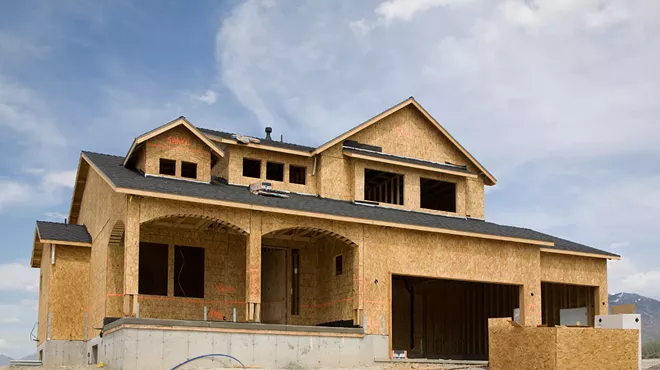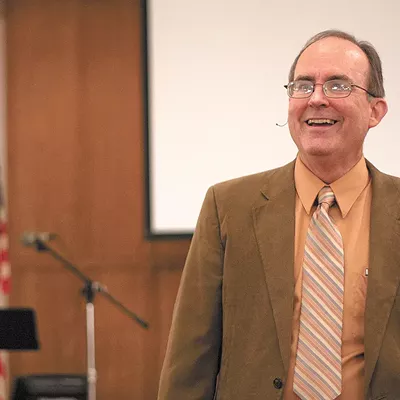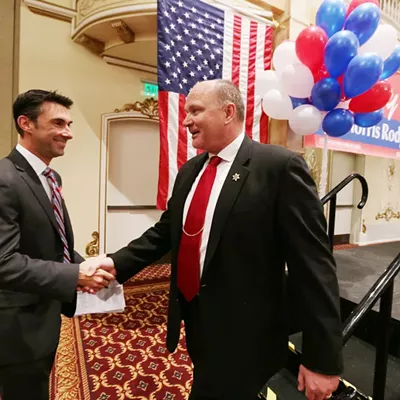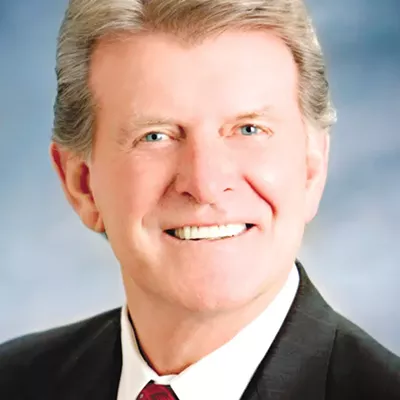The Spokane Home Builders Association was not used to losing.
They'd beaten Envision Spokane three times, won an effort to require a supermajority of the city council to raise taxes and seen their support of an all-Republican Spokane County Commission upheld by voters. Then came last fall's election. Their funding of ads attacking two left-leaning city council candidates as "bought and paid for" sparked controversy and proved ineffective: both candidates won.
Now, in the face of a stark political split in City Hall — a conservative mayor and a 5-2 "veto-proof" liberal majority on the city council — one of Spokane's most outspoken lobbying groups faces an uphill battle. In response, it's doubling down on city issues and eying potential compromise.
At a recent city council meeting, even amid a rare moment of agreement between the home builders and the city council, Councilman Jon Snyder took the chance to scold the group from the dais.
"What I'd say to the home builders is you are one of the most highly politicized organizations in our community — just incredibly partisan. It's amazing that we're able to cooperate on something like this," Snyder said. "I would implore you to look at more ways to be cooperative with this council instead of coming out against us again and again and again, ad nauseam."
The moment was a boiling over of a simmering tension between the organization and the council, especially Snyder, a transportation-fixated, sprawl-fighting liberal.
The Spokane Home Builders Association is comprised of nearly 700 people in the homebuilding industry. Its work is split between education and political advocacy. Michael Cathcart, the group's government affairs director and chief lobbyist, challenges the label "conservative."
"We're pretty moderate in terms of the positions we take, I think," he says. "We're just very pro-business, pro-building industry. That's the point of why we exist."
Yet the organization's campaign work favors conservatives, and Cathcart's previous job was as an aide to Republican State Sen. Michael Baumgartner. According to records from the state Public Disclosure Commission, the Spokane Home Builders Association has shown steady support of right-leaning candidates since 2000, including Mayor David Condon, former home builders lobbyist and county commissioner Mark Richard, current commissioners Todd Mielke, Shelly O'Quinn and Al French, former councilwoman Nancy McLaughlin and John Ahern, who ran against Snyder last year. In his 2012 introductory column in the association's newsletter, Cathcart set the stakes of letting the other side win.
"Just take a walk down the East end of Main [Avenue] and you'll find a plethora of organizations in the Saranac 'Community' building created with the sole purpose of advocating for the further elimination of your property rights and the further implementation of business destroying regulations," he wrote. "The homebuilding industry and specifically your small business cannot, and should not, have to continue putting up with these irresponsible policies any longer. ... We are not going to continue to just sit and play defense every time bad policies are brought forward by our elected officials."
In the more conservative Spokane Valley and among the county commissioners, the home builders tend to find a welcoming environment. At times, that's extended to the mayor's office and the conservatives on the city council.
Councilman Mike Allen, who has received campaign funding and been endorsed by the home builders, says the group is "just one of the organizations out there, like the Lands Council or the Center for Justice or anyone else. They have particular areas they want to advocate for."
In what became one of this year's most controversial issues inside City Hall, the association successfully lobbied the mayor to veto a council-passed ordinance. Snyder introduced, and the council passed, a law preventing the city from committing water and sewer service to developments in the expanded Urban Growth Area until any appeals to the expansion were finished. The mayor vetoed the move, citing concerns that it hadn't been thoroughly vetted.
"A lot of people were encouraging the mayor [to veto], but I think we were a very loud voice," Cathcart says.
Elsewhere, the tactics have raised ire.
"It seems like at every turn at which anything development-related comes up that's not something they can control, they will fight to kill it," says Kai Huschke, campaign director for Envision Spokane, which proposed a far-reaching Community Bill of Rights that would have, among other things, given neighborhoods the ability to stop developments. "That has been their M.O. ... If it barely touches their realm of control, they'll come after you."
"The home builders are basically an arm of the Republican party in the city," Snyder says. "I respect Michael ... but he's got a pretty staunch, hard-right, libertarian, Ron Paul background and he's pretty ensconced in Republican politics. [His hiring] sent a message in and of itself."
But the association has also shown occasional support for progressives, including a small donation to former Mayor Mary Verner's 2005 race for city council. After significant membership losses (and in turn funding cuts) during the recession, the group is now in a "rebuilding phase," Cathcart says. Whether they — and a largely adversarial council — can embrace compromise could have big implications for Spokane's future.
Seated around a rectangular stone meeting table, members of the home builders association listen to developer Jim Frank like he's telling a fairy tale.
"We've had a year's wait list for houses there," Frank says of his company's mixed-use Kendall Yards development. "We've developed a couple hundred apartments there and [have] 100 percent occupancy, and we're pushing rents as high as $1.40 a square foot."
"Wow," a builder at the table says, almost in a whisper.
"Typically," Frank continues, "rents in Spokane — you'd be lucky if you're getting a dollar a square foot."
Over the next hour, Frank clicks through slides citing city zoning codes that prevent other, similar developments from cropping up. (Kendall Yards received special exemptions early on and has not been bound by those rules.) All the while, he's selling the home builders on his vision in their own language: there's money to be made.
"These units here sold for $120,000 in Kendall Yards," he says, pointing to a photo of shiny, narrow townhouses. "There's a lot of people that like living in townhouses and it's not just empty nesters. ... There are big market segments that this works for."
While the types of codes and regulations the home builders fight may not be the stuff of headlines or protests, the building community sits firmly at the center of one of the biggest issues facing the city: As Spokane crawls out of the recession, how will it grow? Will future development in the city be dense and focused on pedestrians and cyclists, or will it spill out at the city's edges? Should we aim for more developments like Five Mile, or more along the lines of Kendall Yards?
"We're in a race right now," Snyder says. "We're coming out of the recession. Communities across the country that compete with us are now deciding whether they are going to go all-in in reinvesting in their communities coming out of this recession or if they're going to back off and wait. I'm a strong proponent of 'It's time to go all-in.'"
While debates rage on about the urban growth area and whether the city holds enough developable, profitable land, the city council and the home builders agree there is a growing market for urban housing. And this, amid all the political bickering, may be the place the association can find common ground with the most liberal city council they've faced in years.
Snyder, currently floating the idea of expanding a pilot project to allow for more townhouses and other dense development in certain parts of the city, says, "I need people to show support, probably more than just Jim [Frank]."
Cathcart says his group, too, is interested in loosening building codes to get "the government out of the way so that the market can make that [kind of development] possible."
"If that's what they really believe," Snyder says suspiciously, "come at me, man. Let's do it." ♦

























